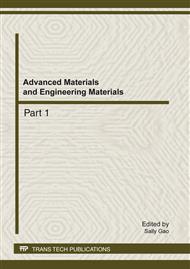[1]
Haluk Topcuogulu, Salim Hariri, Min-You Wu: Performance-Effective and Low-Complexity Task Scheduling for Heterogeneous Computing, IEEE Transactions on Parallel and Distributed Systems, 3rd ed., vol. 13, (2002), pp.260-274.
DOI: 10.1109/71.993206
Google Scholar
[2]
Ewa Deelman, Gurmeet Singh, Mei-Hui Su: Pegasus: A framework for mapping complex scientific workflows onto distributed systems, Scientific Programming, (2005). 3rd ed., vol. 13, pp.219-237.
DOI: 10.1155/2005/128026
Google Scholar
[3]
Etminani K. , Naghibzadeh M.: A Min-min Max-min selective algorithm for grid task scheduling, Internet, 2007. ICI 2007. 3rd IEEE/IFIP International Conference in Central Asia (2007), pp.26-28.
DOI: 10.1109/canet.2007.4401694
Google Scholar
[4]
Jinquan Zhang, Lina Ni, Changjun Jiang: A Heuristic Scheduling Strategy for Independent Tasks on Grid. Intelligent Systems, GCIS '09 (2009), 2nd ed, pp.35-38.
DOI: 10.1109/hpcasia.2005.5
Google Scholar
[5]
Michalas A, Louta M.: Adaptive Task Scheduling in Grid Computing Environments. Semantic Media Adaptation and Personalization, SMAP '09, (2009), pp.115-120.
DOI: 10.1109/smap.2009.25
Google Scholar
[6]
Chien-Min Wang, His-Min Chen, Chun-Chen Hsu: Online Metatask Scheduling Heuristics for a Bidding-based Distributed System, High Performance Computing and Communications (2009). pp.11-19.
DOI: 10.1109/hpcc.2009.91
Google Scholar
[7]
Abdulal W., Al Jadaan O., Jabas A., Ramachandram S. : Genetic algorithm for grid scheduling using best rank power, Nature & Biologically Inspired Computing (2009), 9th ed. vol. 11, pp.181-186.
DOI: 10.1109/nabic.2009.5393679
Google Scholar
[8]
Freund R. F., Gherrity M., Ambrosius S., Campbell M., Halderman M., Hensgen D. : Scheduling resources in multi-user heterogeneous computing environments with smartNet, Proceedings of the Seventh IEEE Heterogeneous Computing Workshop (1998).
DOI: 10.1109/hcw.1998.666558
Google Scholar
[9]
Armstrong R., Hensgen D., Kidd T. : The relative performance of various mapping algorithms is independent of sizable variances in run-time predications, Proceedings of the Seventh IEEE Heterogeneous Computing Workshop (1998).
DOI: 10.1109/hcw.1998.666547
Google Scholar
[10]
Muthucumaru M., Shoukat A., Howard J. S., Debra H., Richard F. F. : Dynamic matching and scheduling of a class of independent tasks onto heterogeneous computing system, Proceedings of the Eighth IEEE Heterogeneous Computing Workshop (1999).
DOI: 10.1109/hcw.1999.765094
Google Scholar
[11]
P. Tang, P.C. Yew, C. Zhu: Impact of self-scheduling on performance of multiprocessor systems, 3rd International Conference on Supercomputing (1988), pp.593-603.
DOI: 10.1145/55364.55422
Google Scholar
[12]
Liang Liang, Xue-Gong Zhou, Ying Wang, Cheng-Lian Peng: Online Hybrid Task Scheduling in Reconfigurable Systems, Computer Supported Cooperative Work in Design (2007), pp.1072-1077.
DOI: 10.1109/cscwd.2007.4281589
Google Scholar


